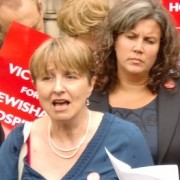 Croydon Healthcare Consortium was among the second wave of 89 GP pathfinder groups announced by Health Minister Andrew Lansley on Tuesday as part of sweeping changes to the organisation of the NHS .
Croydon Healthcare Consortium was among the second wave of 89 GP pathfinder groups announced by Health Minister Andrew Lansley on Tuesday as part of sweeping changes to the organisation of the NHS .
Being one of the GP pathfinder groups will mean that the consortium, along with other healthcare groups, will work together to manage their local budgets and purchase services for patients direct. This will mean GPs will be directly in control of commissioning care and services for their clients from private companies and independent providers.
According to the Department of Health, the Croydon Healthcare Consortium are already leading the way in improving patient access to diagnostics, treatment and care. In response to feedback from patients, the Consortium was able to introduce mobile screening clinics at six Croydon GP practices to provide heart monitoring and ultrasound. The Department of Health states that the next round of changes will provide patients with greater choice and convenience, reducing travel expenses and provide faster testing, diagnosis and treatment.
Lansley said: “If we want better results for patients and a more efficient NHS, then we must devolve power to General Practices. GPs and nurses are ready and willing to take on commissioning responsibilities, the pathfinders to date demonstrate this but most importantly, the changes will enable them to make the decisions that better meet the needs of their local communities and improve outcomes for their patients.”
Shadow Health Secretary John Healy disputed suggestions that reform would improve service for patients. “The NHS is already showing signs of strain,” he said. “Patients who now see their operations cancelled or services cut back will be the victims of this reckless NHS reorganization.”
James Gubb, head of health for Civitas, the civil society think-tank, pointed out that disruptions always accompany reorganisation.
“In every past top-down restructuring of commissioning in the NHS there has been a period of disruption, during which patient care has suffered as managerial attention has been diverted from concerns of quality to putting in place new structures and processes. A repeat performance now, at a time when NHS finances are going to be squeezed, will mean longer waits and pressures to ration treatment.”
Priya Sivathasan, a GP from New Cross, expressed concern that market forces would not suit the health service. “The new bill will encourage the privatisation of primary and secondary care,” she said. “Quality will decline, services will be profit driven and patients will suffer, you can’t base the NHS on a business model. It’s not Tesco or Sainsurys”.
Dr Ken Aswani , a Leytonstone GP, told EastLondonLines radio that under the proposed system, in which Primary Care Trusts are scrapped and GPs take control of the NHS budget, doctors would have to estimate how many of a particular operation would be needed each year and balance it against the budget.
But he denied a claim made by the president of the Royal College of Surgeons (RCS), John Black, that pressure to cut costs would lead to the “backdoor rationing” of non-emergency operations for conditions such as hernias, cataracts and arthritic joints. He said that, if a person needs a service then: “money will have to take second place.”
ELL talks to Dr Ken Aswani about NHS budget reforms by ELL Audio
Kieran Mullan, from the Patients Association, said the criticism by John Black made the valuable point that people’s health needs would not go away. He told ELL radio that he was concerned that the reforms were coming in too fast and that a proper pilot programme should have been done first. He told ELL radio that, with existing budgets, they were already hearing from patients whose operations have been cancelled as the NHS tries to save money. There is concern that with effectively falling budgets, patients will suffer as the reforms are brought in.
ELL talks to the Patient Association’s Kieran Mullan by ELL Audio
GP consortia like Croydon, which consists of 19 practices serving 120,000 people, are set to take on statutory responsibilities from April 2013.
ELL extra coverage by Tom Bonnett




